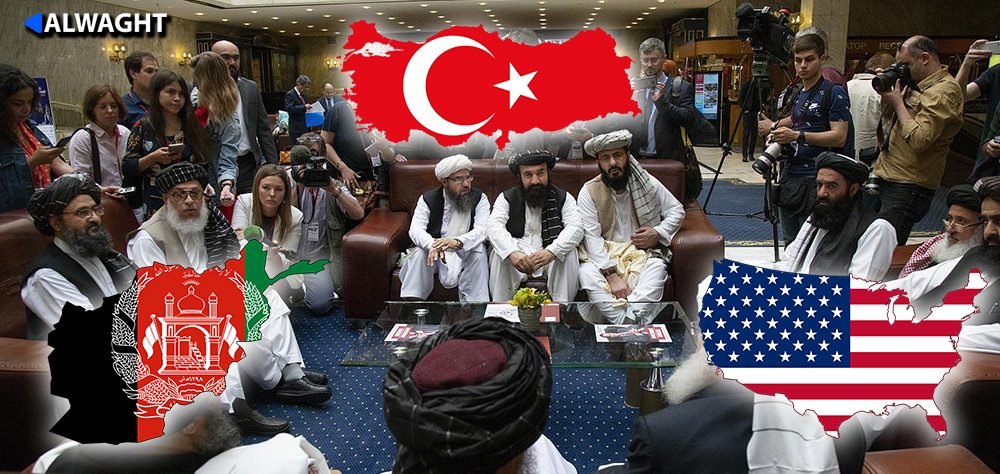Alwaght- The preparations are underway for US-facilitated, intra-Afghan peace conference in Istanbul.
The US State Department said that the preparations were going on for the conference and the Afghan President Ashraf Ghani has expressed his “full readiness” for the event.
At the same time, sources said that the US President Joe Biden was mulling whether to extend or withdraw the remaining 3,500 US troops from Afghanistan on May 1.
Under the previous US administration's agreement reached with the Taliban, all US troops must leave Afghanistan by earlier this month, but US military officials have suggested that the deadline should be extended, mainly due to Afghanistan's sensitive security situation.
Abdullah Abdullah, the head of the High Reconciliation Council of Afghanistan, in a Facebook post said that "the work of analyzing and unifying the ideas and views expressed in the plan, which were submitted to the Supreme National Reconciliation Council by political parties, the government, civil society organizations, the media, and the citizens of the country, has been completed.”
After finalization, the plans will be sent to a meeting of the SNRC, said reports.
The “decisive” Istanbul meeting on the peace in Afghanistan will be held on April 16.
The meeting will continue for 10 days and will try to get the Afghan government, the Taliban, and various political groups to agree on Afghanistan's "political future".
The summit has been called “one of the most important meetings on the future of peace in Afghanistan,” that the international community expects Afghan groups to agree on an end to the war and the "formation of a transitional government of peace" in the country.
Ghani’s three-stage plan
As the Turkish summit on Afghanistan's political future approaches, President Ghani outlined his peace plan and announced the Afghan government's full readiness to attend.
He has recently unveiled a three-stage plan, titled “reaching an end state,” in an event at the presidential palace.
Images from the meeting have been published, and Ghani stressed the need to seize the opportunity to establish peace in the country, saying that the government will participate in the meeting in Turkey with full readiness.
“We are fully prepared to attend the Turkish summit and Zalmay Khalilzad and his colleagues will return to Kabul next week for a constructive discussion with the United States. Our discussion is not scattered and is a regular one,” he was quoted as saying.
The Afghan leader added that if the good for the country lied in a short life of the current government, he and his colleagues were ready to arrange early elections and he may not run for the post.
“The future Afghanistan leader should obtain legitimacy from the elections,” he further said.
Establishing a ceasefire is one of the main demands of the Afghan government, before reaching a peace agreement with the Taliban. The insurgent group has so far declined the demand and insisted that the foreign forces must leave.
Outlining his peace plan, Ghani highlighted the significance of the constitution, adding that any peace plan without the constitution would “go against the values of republic.” Until elections and reforming the constitution, any negotiations and solution should comply with the current national constitution.
The role of the UN in the Afghan government's peace efforts was another issue that the president emphasized in describing his peace plan, saying that there was no alternative to the UN. He added that ensuring lasting peace in Afghanistan required the assurance of the Security Council and the international community.
Ghani’s peace plan has three stages: Political stability, forming a government of peace, and consultations for “reaching an end state.”
But the Taliban has rejected the initiative, saying that it was unpractical.
In addition to Ghani’s plan, the US special envoy to Afghanistan Zalmay Khalilzad has received over 30 initiatives from various political parties and civil society, said SNRC.
Warnings about resumed war
From another side, the former vice president has warned that if Istanbul conference produces no results, they will fight. General Abdul Rashid Dosum, who served vice president from 2014 to 2020 and heads the National Islamic Movement of Afghanistan, in a meeting with a number of Turkish parliamentarians and Afghan students in Ankara said: “We are not leaders who came from Europe and America. If the Istanbul meeting yields no outcome and another war is imposed on us, we will declare war and resistance to the militants.” He continued: “We are for peace and we hope Istanbul summit makes results. People have big expectations of this meeting.”
Will Istanbul meeting help peace negotiations?
Many have cast doubt on the success of Istanbul conference for peace, however.
Part of this pessimism stems from the ideological differences between the Taliban and the government. That is while the group sees itself in a superior position and would not easily accept sharing the power. Over the past two decades, Kabul and the Taliban have used war in pursuit of their aims, as if violence and conflict were entrenched parts of the power struggle in the Central Asian nation. Even Taliban power capture came through war. In the past decades, the country was more immersed in war and tensions than in stability and peace.
An entrenched and structured feature of Afghanistan is the country's ethnic-based divisions, which make it difficult to participate in the central government.
From another side, presence of various actors in the country’s developments has been challenging to a final peace achievement.
Many regional countries view the US proposed pro-peace initiative with doubt and each of them, including Pakistan, China, Russia, Iran, and Turkey, have their own concerns and security interests, beside sometimes conflicting visions. Afghanistan peace conferences in Doha, Moscow, and now Istanbul reveal the multitude of actors involved in Afghanistan developments, which is one of the important obstacles ahead of comprehensive and long-term peace in Afghanistan.



























